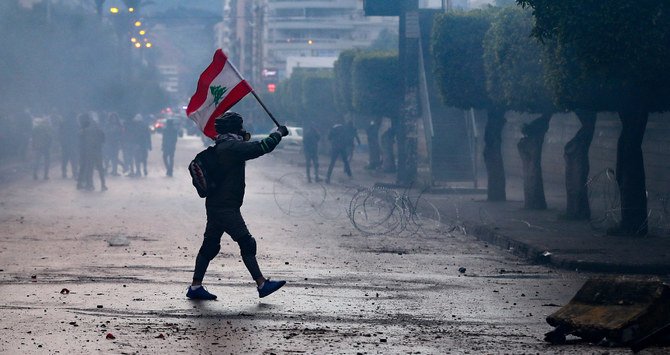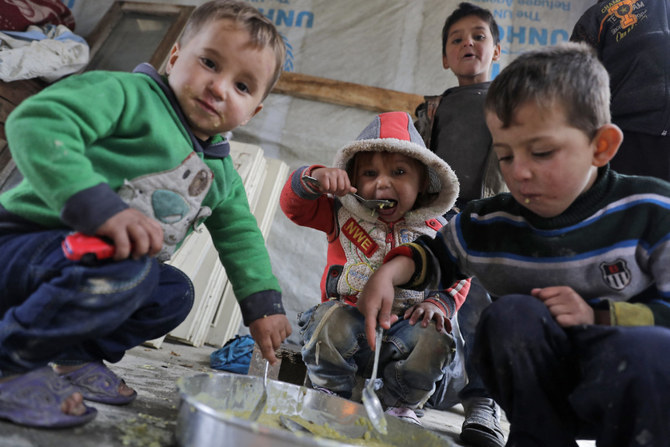Najia Houssari
BEIRUT: Lebanon on Thursday launched an electronic platform for citizens and residents wishing to receive the coronavirus vaccine.
Meanwhile, protests over the full lockdown have spread to cities in the south of Lebanon, considered as pro-Hezbollah and Amal Movement.
Demonstrations in Tripoli turned violent — a protester was killed and tens of people were injured during clashes with security forces that have continued for the fifth consecutive day.
In a conference on Thursday, Lebanon’s Caretaker Health Minister Hamad Hassan hoped citizens would “respond to the national plan to inoculate over 80 percent of the population and achieve herd immunity to protect society from the virus.”
Registration began as soon as the platform’s launch was announced, with an average of 2,000 people visiting the site every five minutes.
The Health Ministry said that “the official vaccination platform protects the privacy of beneficiaries as well as the database and was tested under the supervision of an IT team from the World Bank to ensure it cannot be hacked.”
Hassan, who has recently recovered from COVID-19, said: “The vaccination plan requires the commitment of all institutions and administration to the principle of equality and justice above any other consideration, whether political, regional or sectarian.”
Caretaker Information Minister Manal Abdel Samad said in a press conference: “The number of coronavirus cases in the productive sectors is extremely high, with 72 percent of the cases from the productive segments of society, i.e., those between 20 and 59 years old, which reflects the danger of this pandemic.”
Abdel Rahman Bizri, head of the national committee for the administration of the COVID-19 vaccine, told Arab News: “Lebanon needs to vaccinate between 70 and 80 percent of its population to achieve herd immunity.”
“The Pfizer vaccine that Lebanon has chosen for its vaccination plan is expected to arrive to the country between Feb. 7 and 15, to be followed by more doses in in March,” he said.
The first phase of the vaccination plan is expected to cover medical staff and workers in the health care sector, as well as citizens and residents who are 75 and older, to be followed by younger groups in the next phases.
MP Assem Araji, head of Parliament’s health committee, said: “No serious side effects have yet been seen to the vaccination against the coronavirus. Do not hesitate to take it.”
People on social media have been sharing videos and medical articles warning against the vaccination, claiming that the vaccine causes dangerous side effects or alters recipients’ DNA.
To counter these claims, the ministry has launched the message “count to 10 before you spread it,” urging people on social media to check their facts before spreading false and misleading information.
The programmer of the vaccination platform, Ali Roumani, said: “Racing for registration will not give priority to anyone. The vaccine will be given according to clear and specific criteria.”
People who register on the platform will receive a text message with the date of the vaccination of the group they belong to. After receiving the first dose, the platform will automatically set the date for the second dose, which will be given about three weeks later.
Claudio Cordoni, director of UNRWA affairs in Lebanon, has reassured Palestinian refugees in Lebanon that “they will be included in the free national vaccination plan.”
The Health Ministry received food and medical aid from Egypt and the Arab Ministers Council on Thursday. Three warplanes arrived in Rafic Hariri International Airport, two of them carrying aid from the Egyptian government and one from the Arab League.
Egypt’s Minister of Health Dr. Hala Zayed said that the airlift carried “a message of love and solidarity from President Abdel Fattah El-Sisi and the Arab League Secretary-General Ahmed Aboul Gheit.”
“The airlift consists of two aircrafts carrying medicine and medical supplies to address the coronavirus and a third aircraft carrying milk for babies. The airlift was launched after the Beirut blast and will continue as long as needed,” she said.
The Arab League later announced in a statement that “the council of Arab Health Ministers has decided to support Lebanon by providing health equipment worth over eight million Egyptian pounds or half a million dollars.”
Lebanon has been reporting new records in the number of coronavirus fatalities in the past few days, reaching 80 deaths a day.
Authorities have discussed the possibility of extending the full lockdown until Feb. 15.
On Thursday, Tripoli bid farewell to Omar Farouq, the young protester who died of injuries suffered during overnight clashes.
In the Tripoli clashes, protesters used hand grenades for the first time, and were shot with live bullets by security forces.
Protests spread to Bekaa, where activists closed some roads. For the first time, protests also spread to Nabatieh and Tyre in the south of Lebanon, where protesters raised Lebanese flags and denounced “the state’s starvation policy.”






















